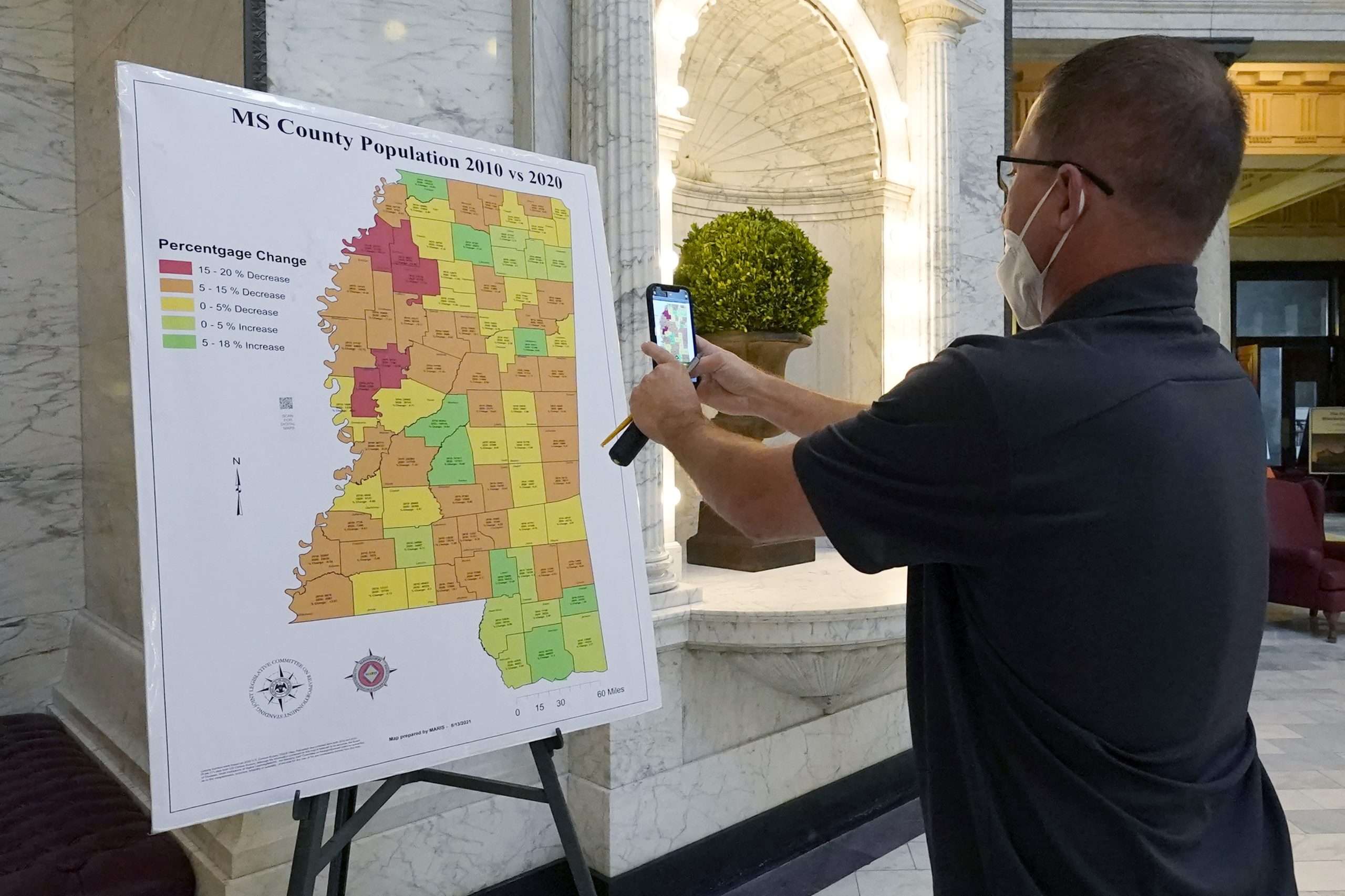Mississippi Today
Supreme Court ruling in Alabama case could aid election lawsuits in Mississippi

Lawsuits alleging that Mississippi's legislative and judicial districts dilute Black voter strength could be bolstered by a recent U.S. Supreme Court ruling.
In a surprise ruling last week, the nation's highest court found that the seven U.S. House seats in Alabama were unconstitutional and violated the federal Voting Rights Act because they diluted Black voter strength. Presumably, that ruling will force the congressional districts to be redrawn in Alabama and perhaps in other states and could impact the balance of power in the U.S. House.
The ruling could also have an impact in Mississippi. In February the U.S. Supreme Court refused an effort to continue a decades-old lawsuit that placed congressional redistricting in Mississippi under the jurisdiction of a three-judge federal panel. The federal panel had overseen the drawing of Mississippi's congressional districts since the early 2000s. But with the state Legislature redrawing the districts in 2022 after the 2020 Census, the federal panel opted to end its jurisdiction. A group challenged the decision to end the lawsuit, claiming the districts drawn by the Legislature still diluted Black voter strength.
The U.S. Supreme Court refused the effort to keep congressional redistricting under the jurisdiction of the three-judge panel. Theoretically, the decision in the Alabama case could leads to groups again challenging whether the congressional district in Mississippi dilute Black voter strength.
The decision in the Alabama case also could impact lawsuits challenging the constitutionality of the drawing of the 174 Mississippi House and Senate districts and the three districts used to elect Mississippi Supreme Court justices and commissioners to the Public Service Commission and the Transportation Commission.
Jarvis Dortch, executive director of the Mississippi ACLU, said the Supreme Court decision in the Alabama case “affirmed the (federal) Voting Rights Act (and) prevents states from packing or cracking Black communities in a way that limits their ability to elect candidates of their choice.”
“This is exactly why the ACLU of MS is challenging Mississippi's recently enacted legislative districts and the decades-old state Supreme Court district lines,” Dortch said.
READ MORE: Lawmakers face redistricting lawsuit during 2023 election cycle
The groups filing the lawsuits challenging the legislative districts and the judicial districts include the ACLU of Mississippi and the national chapter of the American Civil Liberties Union, the national and state chapter of the NAACP, the Lawyers Committee for Civil Rights Under Law, the law firm of Morgan, Lewis and Bockius, the Mississippi Center for Justice and others.
The groups filing the lawsuit have asked the three judge federal panel hearing the case to set an expedited trial date so that if they prevail a special election could be set for November 2024 to elect legislators under new districts. The groups are not trying to hold a trial quick enough to have new legislative districts drawn, should they prevail, for the regularly scheduled legislative elections in November of this year.
The lawsuit says the state Legislature's redrawing of the House and Senate districts in 2022 to match population shifts gleaned from the 2020 Census “packed” Black voters in a limited number of districts to dilute their electoral impact.
Carroll Rhodes of Hazlehurst, a longtime civil rights attorney who is involved in the lawsuit, has said the new legislative districts violate federal law and the U.S. Constitution by “packing” Black voters in a smaller number of districts to dilute their strength.
Rhodes and others claim that a new redistricting plan could generate more Black majority districts in addition to increasing the number of African Americans in other districts to provide them more impact in non-minority majority districts.
Dortch pointed out that in 2010, there were 12 House districts that had Black populations of over 40% but not a majority, meaning they could have a significant impact in those districts. But under the maps drawn in 2022 by the Legislature, there is only one district in that category.
A separate lawsuit says the three Supreme Court districts that have not been redrawn in more than 35 years also are unconstitutional.
The state, which has an African American population of about 38%, has nine Supreme Court justices — just one of whom is Black.
Northern District Public Service Commissioner Brandon Presley, who is running for governor as a Democrat, said the ruling in the Alabama case “was a victory for the Voting Rights Act — and the generations of Southern organizers who made it a reality. Instead of shutting the door on Black and minority communities, those of us in elected office must protect this fundamental right and work to bring new voters into our democracy.”
Republican incumbent Gov. Tate Reeves did not comment on the case on social media.
This article first appeared on Mississippi Today and is republished here under a Creative Commons license.
Did you miss our previous article…
https://www.biloxinewsevents.com/?p=248431
Mississippi Today
On this day in 1896


MAY 18, 1896

The U.S. Supreme Court ruled 7-1 in Plessy v. Ferguson that racial segregation on railroads or similar public places was constitutional, forging the “separate but equal” doctrine that remained in place until 1954.
In his dissent that would foreshadow the ruling six decades later in Brown v. Board of Education, Justice John Marshall Harlan wrote that “separate but equal” rail cars were aimed at discriminating against Black Americans.
“In the view of the Constitution, in the eye of the law, there is in this country no superior, dominant, ruling class of citizens,” he wrote. “Our Constitution in color-blind and neither knows nor tolerates classes among citizens. In respect of civil rights, all citizens are equal before the law. The humblest is the peer of the most powerful. The law … takes no account of his surroundings or of his color when his civil rights as guaranteed by the supreme law of the land are involved.”
This article first appeared on Mississippi Today and is republished here under a Creative Commons license.
Did you miss our previous article…
https://www.biloxinewsevents.com/?p=359301
Mississippi Today
Renada Stovall, chemist and entrepreneur
Renada Stovall sat on the back deck of her rural Arkansas home one evening, contemplating life when she had a life-altering epiphany…
“I gotta get out of these woods.”
She heard it as clear as lips to her ear and as deep as the trees surrounding her property. Stovall's job as a chemist had taken her all over the country. In addition to Arkansas, there were stints in Atlanta, Dallas and Reno. But she was missing home, her parents and friends. She also knew, she needed something else to do.
“I thought, what kind of business can I start for myself,” said Stovall, as she watered herbs growing in a garden behind her south Jackson home. Some of those herbs are used in her all-natural products. “I know when I lived in Reno, Nevada, where it's very hot and very dry, there really weren't products available that worked for me, my hair, and my skin suffered. I've got a chemistry degree from Spelman College. I took the plunge and decided to create products for myself.”

In 2018, Stovall's venture led to the creation of shea butter moisturizers and natural soaps. But she didn't stop there, and in December 2022, she moved home to Mississippi and got to work, expanding her product line to include body balms and butters, and shampoos infused with avocado and palm, mango butter, coconut and olive oils.
Nadabutter, which incorporates Renada's name, came to fruition.

Stovall sells her balms and moisturizers at what she calls, “pop-up markets,” across the state during the summer. She's available via social media and also creates products depending on what of her ingredients a customer chooses. “My turmeric and honey is really popular,” Stovall added.
“The all-natural ingredients I use are great for conditioning the skin and hair. All of my products make you feel soft and luscious. The shea butter I use comes from West Africa. It's my way of networking and supporting other women. And it's my wish that other women can be inspired to be self-sufficient in starting their own businesses.”





This article first appeared on Mississippi Today and is republished here under a Creative Commons license.
Mississippi Today
On this day in 1954
MAY 17, 1954

In Brown v. Board of Education and Bolling v. Sharpe, the U.S. Supreme Court unanimously ruled that the “separate but equal” doctrine in Plessy v. Ferguson was unconstitutional under the 14th Amendment, which guaranteed equal treatment under the law.
The historic decision brought an end to federal tolerance of racial segregation, ruling in the case of student Linda Brown, who was denied admission to her local elementary school in Topeka, Kansas, because of the color of her skin.
In Mississippi, segregationist leaders called the day “Black Monday” and took up the charge of the just-created white Citizens' Council to preserve racial segregation at all costs.
This article first appeared on Mississippi Today and is republished here under a Creative Commons license.
-
SuperTalk FM5 days ago
Martin Lawrence making 3 stops in Mississippi on comedy tour
-
Our Mississippi Home4 days ago
Beat the Heat with Mississippi’s Best Waterparks
-
Our Mississippi Home5 days ago
Charlie’s U-Pik: Opening Soon for the Summer Season
-
Mississippi News Video7 days ago
Local dentists offer free dental care in Amory
-
SuperTalk FM21 hours ago
State auditor cracking down on Mississippians receiving unemployment benefits
-
Mississippi News Video3 days ago
Jackson has a gang problem
-
Kaiser Health News4 days ago
Medicaid ‘Unwinding’ Decried as Biased Against Disabled People
-
Mississippi Today2 days ago
On this day in 1950





























![HIGH SCHOOL SOFTBALL: Vancleave @ East Central (5/9/2024) [5A Playoffs, South State]](https://www.biloxinewsevents.com/wp-content/uploads/2024/05/1715460379_maxresdefault-80x80.jpg)








